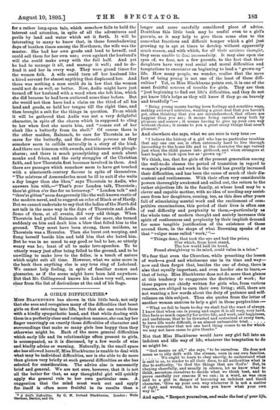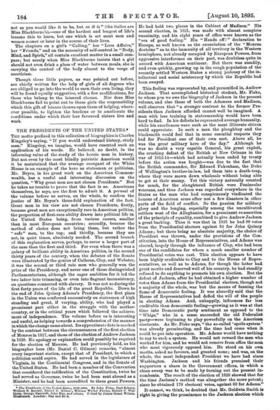A GIRL'S DIFFICULTIES.*
Miss BLACIIBUBNE has shown in this little book, not only that she sees and recognises many of the difficulties that beset girls on first entering into life, but that she can touch them with a kindly sympathetic hand, and that while dealing with them in a perfectly clear and outspoken manner, she can lay her finger unerringly on exactly those difficulties of character and surroundings that make so many girls less happy than they otherwise might be. Each of the more general difficulties which early life and its relationships often present to girls, is accompanied, as it is discussed, by a few words of wise and kindly advice or warning. Naturally, in the small space she has allowed herself, Mies Blackburne is unable to deal with what may be individual difficulties, nor is she able to do more than glance very briefly at such general difficulties as she has selected for consideration. The advice also is necessarily brief and generaL We are not sure, however, that it is not all the better for that, as any thoughtful girl will quickly apply the general rule to her own particular case. A suggestion that the mind must work out and apply for itself is often more fruitful in its results than a • A Girl's Dijj4culties. By G. N. Ireland Blackburne. London : Wells Gardner, Barton, and Co.
longer and more carefully considered piece of advice. Doubtless this little book may be useful even to a girl's parents, as it may help to give them some clue to the somewhat fractious and difficult temper which a girl just growing up is apt at times to develop without apparently much reason, and with which, for all their anxious thought, they seem unable to deal Gueoessiully. It may also open the eyes of, we fear, not a few parents, to the fact that their daughters have very real social and moral difficulties and temptations to encounter on beginning to lead a "grown-up" life. How many people, we wonder, realise that the mere fact of being young is not one of the least of these diffi- culties ? Yet, as Miss Blackburne points out, it is one of the most fruitful sources of trouble for girls. They are then "just beginning to find out life's difficulties, and they do not yet know life's helps as they will know if they go on bravely and trustfully ":—
" Being young means having keen feelings and sensitive ways, making awkward mistakes, wanting a great deal that you haven't got, often thinking that you are misunderstood, that others are happier than you are ; it means being carried away both by pleasure and sorrow ; it means having to give up your own way without choice ; it means to you a great many things that aren't pleasant."
And elsewhere she says, what we are sure is very true
I believe the history of a girl who has no particular troubles that any one can see, is often extremely hard to live through (according to the home life and to the character the age varies) just when the child passes into girlhood, and when strangers at least begin to look upon her as grown up."
We think, too, that for girls of the present generation among the well-to-do classes the period of transition in regard to women's position and work in the world has greatly increased their difficulties, and has been the cause of much of their dis- content and restlessness. With their often very considerable powers thoroughly awakened and called out, the return to the rather objectless life in the family, at whose head may be a clever and capable mother, with no idea of needing any assist- ance from her daughters, coming, too, as this does after years full of stimulating mental work and the excitement of com- petitive examinations, this period of their lives is often one of real difficulty and perplexity to them,—particularly as the whole tone of modern thought and society increases this spirit of restlessness and perplexity by their implicit demand for some tangible justification of the existence of those around them, in the shape of what Browning speaks of as that "vulgar mass (sailed ' work,' "— " Things done, that took the eye and had the price I
O'er which, from level stand, The low world laid its hand,
Found straightway to its mind, could value in a trice."
We fear that even the Churches, while preaching the lesson of work—a good and wholesome one in its time and way— now and then forget that, besides the one of doing, there is also that equally important, and even harder one to learn,--• that of being. Miss Blackburne does not do more than glance at this tendency to exaggerate the doctrine of work ; for these papers are chiefly written for girls who, from various reasons, are obliged to earn their own living ; still, there are not wanting a few words about the duty of patience and self- reliance on this subject. Thus she quotes from the letter of another woman anxious to help a girl in these perplexities :— "What we fail to learn to-day we shall feel the want of always. I know that when one is young and eager it is all very, very hard. One feels so much capacity for active life, and work, and happiness, and usefulness, that to be thwarted and restrained at every turn, to have life made difficult, is an almost unbearable trial Try to remember that not one hard thing comes to us for which we may not have cause to give thanks."
Not that Miss Blackburne would have any girl fall into an indolent and idle way of life, whatever the temptation to do so might be.
"God means us all," she says, "to be ourselves. He does not mean us to idly drift with the stream, even in our own families.
We ought to learn to obey exactly, to understand what is said to us, to render to all their dues, to all authorities what is due to authority, to God the things that are God's.' But, in obeying cheerfully, and usually in silence, let us know what to think, accustom ourselves to decide what we think best, and to prove carefully our reasons if we can; in a word, as was once said to a girl in danger of becoming an indolent and timid character, 'Give up your own way whenever it is not a matter of right and wrong, but be sure you know what your own way " And again, "Respect yourselves, and make the best of your life. not as you would like it to be, but as it is" (the italics are Miss Blackburne's),—one of the hardest and longest of life's lessons this to learn, but one which is set most men and women sooner or later in the course of their lives.
The chapters on a girl's "Calling," her "Love Affairs," her "Friends," and on the necessity of self-control in "Body, Mind, and Spirit," all contain excellent matter in a small cora- pass ; but surely when Miss Blackburne insists that a girl should not even drink a glass of water between meals, she is carrying the control of the body almost to the verge of asceticism.
Though these little papers, as was pointed out before, are chiefly written for the help of girls of all degrees who are obliged to go into the world to earn their own living, they will be found equally suggestive, with a few modifications, for those who belong to the leisured classes. Nor does Miss Blackburne fail to point out to these girls the responsibility which this gift of leisure throws upon them of helping, where. ever possible, to lighten the burdens or to ameliorate the conditions under which their less favoured sisters live and work.



































 Previous page
Previous page